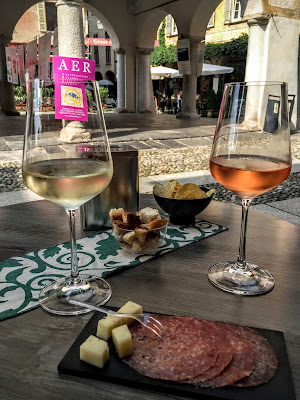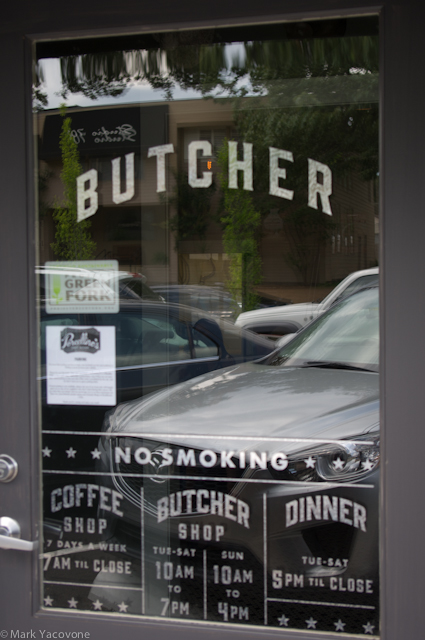Admittedly, there is very little that is overtly southern about
this post.
It is more about the
"eat", and yet, as I dined my way across Piemonte, Italy, I could not
help but draw comparisons to southern cuisine and hospitality.
After all, the Langhe region of Piemonte is
home of the Slow Food movement.
Best
known for their truffles and many of the world's most renowned wines, such as
Barolo, Barbera and Barberesco, life seems to revolve around culinary
pleasures.
Stories are told, friendships
are made, farm to table is a given, meals last for hours and top notch hospitality
are requisite;
all in all, not so
different from the American South.
Possessing a similar terrain as Tuscany, with the rolling, vineyard covered hills, Piemonte is equally beautiful. Every hillside seems to hold a castle. Narrow, hairpin winding roads connect the
little villages, forcing you to drive slowly to take in the beauty. Fog collects in the valleys, giving the
terrain a mystical quality. The towns
remain authentic and the people are real; Old men still gather in the mornings
in the town centers over espresso, old women lug their groceries up steep stone
streets, laundry hangs without shame from every balcony, Fiats are the
largest cars around, wine is served with lunch, and dinner begins after
8pm. The little tourism that is here has
certainly not turned this region into a caricature of itself.

It is impossible to make a dining miscalculation.
Each little osteria, tucked away on an
unassuming side street, was better than the last.
Early on, we gorged on the local specialty,
carne crudo, which is essentially a version of steak tartare made with high
quality, local Piedmonte beef or veal.
I
was reminded of my childhood, when my mom would mix up the ground beef for
hamburgers with spices and worcestershire sauce, and then call me into the
kitchen to taste the raw meat.
Sharing
in that cold, tangy, iron flavor was as exciting as licking the beaters of cake
batter.
One of our more memorable meals was a lunch at
Antica Corona Reale in Cervere, just outside of Bra, the capital of the Slow Food
movement.
We originally had reservations
for dinner, but they called a few days in advance to say the electricity for
the whole village was going to be shut off that night for maintenance, and so
if we would agree to lunch, they would treat us to a bottle of wine.
Cervere is a very unassuming little town, not
a hillside beauty, but a passthrough on your way out of Bra.
We found the restaurant, after some hunting,
directly on the main drag in unremarkable brick building.
The door was locked upon our arrival, a
tradition we were still unaccustomed to, but within moments, it opened to a
group of warm and professional staff who invited us into their
"home".
We were led through the building to an internal
courtyard that was unexpectedly heavenly.
A grape arbor covered the courtyard, dappling the late summer sun. Soothing sounds gurgled from a fountain in
the middle of the courtyard, and was surrounded by a dozen, linen draped
tables, of which four were occupied. We
sank into our chairs and burst into laughter at the joy this special place
elicited. As if on cue, the head server
arrived to pour a glass of sparkling wine to welcome us to the restaurant. And so the slow food began.
Before we even selected the tasting menu, our server
presented a plate of small bites, including one perfect cube of chicken, a
hazelnut crusted croquette, and a savory, luscious profiterole. Following that warm welcome, the chef sent over another treat - an
exquisite bite of ham gelatin with capers that was as visually stunning as it
was delicious. This was a cool cube of
perfection to stimulate our palate for what was to come next.
First up was the Ligurian amberjack carpaccio and tartare with
San Remo shrimp served with fennel, juniper and bergamot. The amberjack fish, both thinly sliced and
chopped, was light and mild, tasting refreshingly of the sea. There were two kinds of shrimp, both served
raw, one tasting similar to gulf shrimp, the second tasting incredibly sweet
and chewy, more like lobster or a langoustine.
Heads on, the juices flavored the meat deliciously. Drizzled at the table with olive oil, the
crisp raw fennel was a fresh counterpoint to the meaty shrimp.
Next was a colorful gazpacho, served with a soft boiled egg,
roasted crispy vegetables and an eggplant puree. The egg yolk blended wonderfully into the
cool tomato gazpacho and leant a richness to the soup.
Our pasta course was a dish of gray rabbit ravioli, with
shallots, foie gras and black truffle.
These perfectly formed little dumplings were earthy, rich and
satisfying.
Throughout the meal, our servers, the maitre d', the head
server, the chef d'cuisine and even the chef's father and former head chef,
stopped by to engage us in conversation and confirm our every need was
anticipated. My heart melted for the
older chef, whose sparkling blue eyes set off his brilliant white hair. He didn't speak English and our Italian is
rough, but with a warm embrace, he welcomed us and commented on our shared
azzuro eyes, a rarity in these parts.

After the first pasta course, we were surprised by a second, a
gift from the chef, who wanted to make sure we had a chance to try the
gorgonzola cheese ravioli with Madernassa pears and an almond butter cream
sauce.
The visual simplicity of the
plate belied the punch of flavors.
This
dish stands out among all others on our trip as my favorite.
The blue cheese combined with the sweet sauce
were unlike any pasta combination I have had or could have imagined.
Our hearty main course was local Piemonte veal, breaded and
served over an egg yolk sauce. The veal
was served rare, tender and fresh, accented by freshly cracked sea salt and a
saute of fresh pumpkin from their kitchen garden.

No Italian meal would be complete without sweets, and in this
case, a whole plate of desserts ranging from torrone (nougat) to panna cotta
and hazelnut ice cream.
We ordered espresso to go with our dessert and as is typical in Piemonte, it came with a second
plate of sweets, which we begged them to pack for us to go (they suggested we eat that one and they would pack a new one to go).
It turns out this is the 200th anniversary of Antica Corona
Reale, a legacy of fine dining beyond any American's comprehension. Originally
a farmhouse, surrounded by acres of land, they have been plating stunning food,
long before farm to table was a thing. Brilliant chefs passed down the legacy
to their progeny, who carried on the tradition, with a little of their own
flare. The restaurant was awarded their
second Michelin star in 2009. Easily,
this was one of the best meals of my life, however mostly for reasons difficult
to articulate. There is something about that courtyard that allowed time to
stand still. It was lush, warm and
beautiful, with white grapes hanging overhead in bunches. The service was impeccable, but not in the
least bit stuffy. I adored our
servers. The food was adventurous and
yet ancient. And of course, a steady
flow of local sparkling wine throughout the meal, only added to the sensuality
of the experience.


Reflecting back on our travels across Piemonte I am struck
again by the strong sense of hospitality and warmth.
Cafes provide dishes and dishes of small
bites of food, upon which you may graze while you wait for your espresso.
Every evening espresso, following dinner, was
accompanied by a complimentary plate of sweets.
Cocktail hour or Aperitivi in Milano came with endless small plates of
cheese and meats or buffets of fresh Italian dishes.
Baristas, who warmed up to us, pressed us with
small wrapped candies, as a sign of affection.
Time is slow and little things, like a nice espresso with friends,
matter.
Colleagues meet after work for
drinks, to socialize, and to laugh loudly in exuberance, scarcely a mobile
phone in sight.
Friends hold hands and
everyone kisses cheeks.
Food expresses
love in Piemonte and there is an abundance of love to go around.
La dolce vita!


 Aperitivi is inexpensive. Our typical aperitivi bills across the Langhe were roughly $10 - $20 euro, total for two people. I am going to break this down a bit. Cocktails during aperitivi come with amazing free food, in Italy! This does sound like nirvana and it is, but there is a refinement expected for such luxuries. Italians typically do not overindulge. Much like their café (coffee), where they order one small shot of espresso, drink and leave, aperitivi is not an all-night affair. Typically, you meet your friends for one drink, whoop it up, and then go home to your life. You rarely see a mobile phone; instead you see friends engaging, laughing and enjoying each other. Even though there is a plate of exquisite food in front of you, you thoroughly enjoy a few nibbles and leave the remainder because you will have dinner shortly.
Aperitivi is inexpensive. Our typical aperitivi bills across the Langhe were roughly $10 - $20 euro, total for two people. I am going to break this down a bit. Cocktails during aperitivi come with amazing free food, in Italy! This does sound like nirvana and it is, but there is a refinement expected for such luxuries. Italians typically do not overindulge. Much like their café (coffee), where they order one small shot of espresso, drink and leave, aperitivi is not an all-night affair. Typically, you meet your friends for one drink, whoop it up, and then go home to your life. You rarely see a mobile phone; instead you see friends engaging, laughing and enjoying each other. Even though there is a plate of exquisite food in front of you, you thoroughly enjoy a few nibbles and leave the remainder because you will have dinner shortly.
























